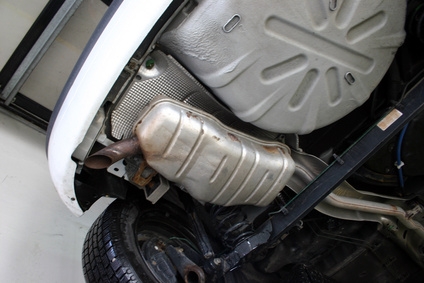
A vehicle's exhaust sound is affected by four factors. The first and greatest is the engine size. The greater volume of engine displacement -- usually measured in liters or cubic inches -- the greater the exhaust output. Assuming the engine will remain the same, muffler type and construction, exhaust system piping, and exhaust-tip style may be altered or replaced to directly affect the overall sound profile of your vehicle. The replacement of exhaust system components with those designed to increase the exhaust output without sound dampening will make your exhaust sound louder.
Replace the muffler with one designed to amplify the sound of your vehicle. Glass packs, straight-through exhausts and straight-pipe designs will significantly increase the sound output over a stock muffler. When you decide to select a new muffler type, consult a muffler shop or select a design that increases the volume of gas expelled through the muffler system without passing through sound-dampening chambers. Mufflers designed with limited baffles also can increase the sound output of your vehicle.
Add a sound-amplifying exhaust tip. Exhaust tips with dual walls, flared ends or large diameters may increase the sound volume of the exhaust output.
Increase the size of your exhaust pipes by 1/2-inch to 1-inch in diameter. This should be done in conjunction with replacement of the muffler to ensure that the gases are not constricted by the old muffler's diameter. The increased volume of gases allowed through your system will not only allow the exhaust gases to be ported from the system more easily, the greater throughput and pipe diameter will create a deeper tone and resonance in the exhaust system.
Connect your exhaust system with welded hangers. If your exhaust system is hanging from the vehicle with rubber mounts, the vibrations transferred from the exhaust system are dampened. Direct connection through welds helps ensure the vibration from the exhaust is heard in the passenger compartment.